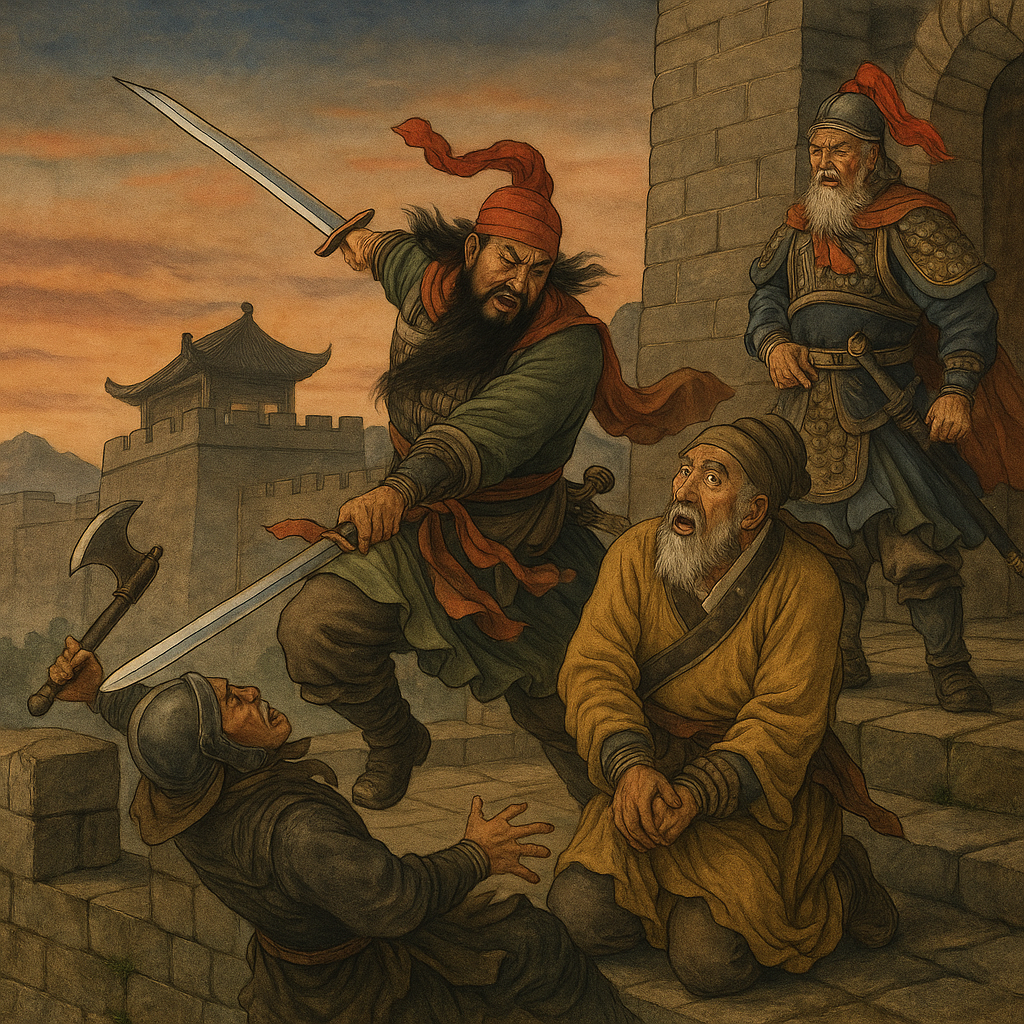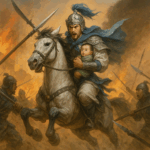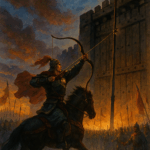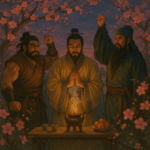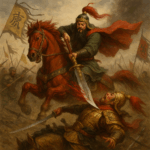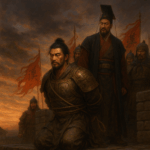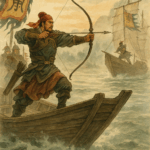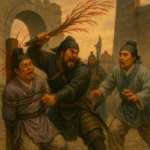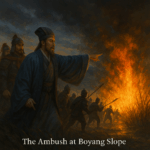Zhuge Liang said to Zhang Fei, “When Zhao Yun took Guiyang, he signed his military dispatch before departing. Today, since you wish to seize Wuling, you too must sign your commission before leading your troops.” Zhang Fei at once affixed his seal to a written pledge with delight, and mounted with three thousand men, riding through the night toward Wuling’s borders.
Huang Xuan, the prefect of Wuling, heard that Zhang Fei’s forces were approaching. He gathered his officers, marshaled his finest soldiers and weapons, and rode out to meet the invader. His adjutant Gong Zhi counseled, “Lord Liu Bei is a prince of the Han and famed for his benevolence, while Zhang Fei’s fame for ferocity is unrivaled. We should not fight him—better to yield and surrender.” Enraged, Huang Xuan cried, “Would you collude with the rebels?” and ordered his guards to drag Gong Zhi out and execute him. His other officers warned that such bloodshed of one’s own family would bring ill fortune, so Huang Xuan dismissed them and led his troops out himself.
After riding twenty li he met Zhang Fei’s vanguard. Fei raised his spear, reared his horse, and bellowed challenge. Huang Xuan called for a champion, but none dared step forward. He spurred his horse and swung his blade alone. At Zhang Fei’s thunderous roar, Huang Xuan’s heart failed him; he wheeled his steed and fled. Fei’s troops surged in pursuit. As Huang Xuan reached the city walls, a storm of arrows rained down. There on the ramparts stood Gong Zhi’s son, proclaiming, “You scorned Heaven’s mandate, so now you bring disaster upon yourself. We and the common people surrender to Lord Liu.” Before he finished, an arrow struck Huang Xuan in the face; he collapsed from his horse, and his soldiers severed his head to present to Zhang Fei. Gong Zhi’s son led the surrendering crowd into the city gates. Zhang Fei then sent him with the official seals to present to Liu Bei at Guiyang. Liu Bei rejoiced and appointed him prefect in place of the fallen Huang Xuan.
Liu Bei himself rode to Wuling to pacify the people, then dispatched a message to Guan Yu: “Zhang Fei and Zhao Yun have each secured a commandery. I hear Changsha remains; if you deem me lacking, please take this opportunity to win that honor.” Pleased, Liu Bei ordered Zhang Fei back to Jingzhou to guard in his stead, and summoned Guan Yu to lead the campaign against Changsha.
Guan Yu arrived and presented himself to Liu Bei and Zhuge Liang. Zhuge Liang said, “Zhao Yun seized Guiyang, Zhang Fei took Wuling, each leading three thousand men. Changsha’s prefect Han Xuan is weak, but he has a veteran commander from Nanyang named Huang Zhong—nicknamed Hansheng—who, though nearing sixty, fights like ten thousand men. You must marshal your troops carefully.” Guan Yu replied, “Why warn me against a mere old soldier? I need not three thousand—just five hundred crack guards will suffice to behead Huang Zhong and Han Xuan and bring their heads here.” Liu Bei protested, but Guan Yu would not yield; he set out with only five hundred guards. Zhuge Liang warned Liu Bei: “Guan Yu underestimates Huang Zhong—he may fail. You should ride out to support him.” Liu Bei agreed and led his own army behind.
Han Xuan, hot-tempered and quick to kill, summoned the veteran Huang Zhong. The old archer declared, “Have no fear, Prefect. With this bow and blade, one thousand of them will die!” He could draw the heaviest bow with ease and hit any target. But from below the steps stepped forward a captain named Yang Ling, declaring, “No need for you to fight—leave it to me.” Han Xuan, glad of the offer, ordered Yang Ling to lead a thousand troops and galloped off. After fifty li he met Guan Yu’s vanguard on the road. Yang Ling snorted and attacked, but Guan Yu, furious, spurred his charger and, with but one stroke, cut the captain down at his stirrups. He drove the routed soldiers back to the city walls.
Alarmed, Prefect Han Xuan summoned Huang Zhong. From the walls, Huang Zhong leapt onto his horse with five hundred riders, galloping across the drawbridge. Guan Yu arrayed his five hundred guards in line and charged. “You must be Huang Zhong!” he roared. The old hero replied, “Since you know my name, dare you invade my lands?” Guan Yu answered, “I came only to present your head!” Over a hundred clashes they fought, neither gaining ground. Han Xuan, fearing for Huang Zhong, beat the drums to call the troops back. Huang Zhong returned to the city; Guan Yu withdrew his men ten li to camp, thinking: “This old general truly is formidable. Tomorrow I shall feign retreat and slay him from behind.”
At dawn they rode out again. Han Xuan watched from the walls and sent Huang Zhong forth once more. They fought another fifty fierce exchanges without resolution. Then Guan Yu feigned panic and fled; Huang Zhong gave chase. As Guan Yu drew near the drawbridge, hesitating whether to strike, Huang Zhong called a battle cry and fled back onto the bridge. Guan Yu, about to follow, looked back to see Huang Zhong swept by his horse’s stirrup and thrown to the ground. Alarmed, he whipped his horse around, raised his blade, and cried, “I spare your life this time—dismount and fight me properly!” The old man leapt back into the saddle and galloped beneath the walls. Prefect Han Xuan, watching, cried, “He lost his horse!” Huang Zhong said, “My steed is too old for battle—that is why I fell.”
Han Xuan asked, “Why did you not shoot him?” Huang Zhong smiled, “Tomorrow I will feign defeat until we reach the bridge; then I will release my arrow.” Pleased, Han Xuan gave him a fine steed in exchange and retired, pondering how best to keep his promise.
That night Han Xuan tossed on his couch, but by morning he was still uncertain. When Guan Yu’s drums signaled the coming fight, Huang Zhong led five hundred horsemen out again. After two days of stalemate, Guan Yu grew restless and charged. They fought thirty mortal passes before Huang Zhong pretended to flee. Guan Yu bore down once more, but at the bridge Huang Zhong drew a bow without arrow, and Guan Yu dodged—no bolt flew. Thinking Huang Zhong had missed, he pressed on; then as he crossed the bridge, the old hero loosed a real arrow that struck Guan Yu’s helm plume. The river troops cried out in awe as Guan Yu, startled, withdrew his men.
Huang Zhong reentered the city; Prefect Han Xuan, enraged, ordered his guards to seize him. Huang Zhong protested his innocence, but Han Xuan raged, “For three days you mock me. Your slip, your saved life, then these feints—surely you conspire with the enemy! You shall die.” As the executioners raised their axes, a warrior burst through the guard, slew them both, and dragged Huang Zhong to safety. He cried, “Huang Hansheng is the bulwark of Changsha—kill him, and you slay its people! Han Xuan is tyrannical and cruel; join me!” Hundreds of townsmen, led by this champion, flocked to join him. Guan Yu, seeing the man’s face like polished dates and eyes bright as stars, recognized him: Wei Yan, an exile from Xiangyang who had sought Liu Bei’s service but been slighted by Han Xuan. Overjoyed, Guan Yu let him lead the uprising; together they stormed the walls. Wei Yan cleaved Han Xuan’s head in two with one blow, hoisted it upon his horse, and presented it at Guan Yu’s banner. The prefect’s soldiers knelt and surrendered.
Guan Yu rode into the city to restore order and invited Huang Zhong to meet him. The old warrior feigned illness. Calling in Liu Bei and Zhuge Liang, Guan Yu recounted the events. Liu Bei rode to Huang Zhong’s home to thank him; the veteran begged permission to bury Han Xuan’s body east of Changsha. A later poem praised Huang Zhong:
“His martial spirit stands with heaven,
His white hair fierce in Han’s southern realm.
Till death he bowed in humble grace,
Yet faced defeat without regret.
His blade like frost revealed his might,
His steed like wind recalled past fights.
His lofty name shall ever shine,
Under the lone moon by Xiangtan.”
Liu Bei honored Huang Zhong greatly. He then summoned Wei Yan—but upon hearing his role in killing Han Xuan under rebel banners, Zhuge Liang ordered his execution. Liu Bei protested, “Wei Yan has served me faithfully!” Zhuge Liang replied, “He benefited from my provisions but betrayed his lord—that is disloyal. He seized Wuling under our colors—that is unjust. I see treason in his heart; we must strike him down to end future evils.” Liu Bei feared that killing him would terrify other former enemies into rebellion; he begged mercy. Zhuge Liang pointed at Wei Yan: “I spare your life once more. Serve with utmost loyalty—betray me, and your head will pay the price.” Wei Yan bowed and withdrew.
Liu Jie, Liu Du’s nephew at Youjiang, was recalled to serve under Liu Bei in Changsha. With the four southern commanderies pacified, Liu Bei returned to Jingzhou and renamed Youjiangkou “Gongan.” Peace and prosperity spread; scholars and officials flocked back; troops garrisoned mountain passes.
Zhou Yu, recovering at Chaisang, left Gan Ning to guard Baling and Ling Tong at Hanyang, each commanding warboats under ready orders. Cheng Pu led the remaining officers to reinforce Hefei. Since the Battle of Red Cliffs, Sun Quan had camped at Hefei, clashing with Cao Cao’s forces ten times without decisive result. Hearing Cheng Pu’s arrival, he rode out to meet him. When Lu Su arrived ahead of Cheng Pu, Sun Quan dismounted to greet him. All the generals marveled at the honor given to Lu Su. Sun Quan invited him to mount and rode alongside, whispering: “I dismounted to welcome you—does this please your heart?” Lu Su replied, “Not yet.” “Then what is fitting?” asked Sun Quan. Lu Su said, “Let your virtue shelter the realm and unite the Nine Provinces, so that my name may be recorded in history.” Sun Quan laughed, then held a grand banquet and reviewed the war council.
Suddenly a dispatch rider arrived from Zhang Liao bearing a challenge. Sun Quan read it and fumed, “Zhang Liao dares mock me! He knew Cheng Pu’s army was coming and sent this to provoke me! Tomorrow I will not use fresh troops but will march myself!” He ordered the army out at the fifth watch to advance on Hefei at dawn.
By first light, both armies met halfway. Sun Quan in golden armor rode forward, flanked by generals Song Qian and Jia Hua with their halberds. When the war drums ceased, Cao Cao’s ranks opened: Zhang Liao in the center, Li Dian on the left, and Yue Jin on the right. Zhang Liao charged Sun Quan, but a rider burst from the gates—it was Taishi Ci. He and Zhang Liao fought fiercely for eighty blows without resolution. Meanwhile Li Dian whispered to Yue Jin, “That golden-armored rider is Sun Quan. If we capture him, we avenge our army!” Yue Jin wheeled his horse, ran past Sun Quan, and struck him heavily. Song Qian and Jia Hua tried to interpose but broke their halberds; Li Dian loosed an arrow that felled Song Qian. Taishi Ci saw his comrade fall, abandoned Zhang Liao, and returned to the fray. Zhang Liao pressed his own counterattack, but Sun Quan’s subordinate Cheng Pu charged from the flank, rescuing him. Zhang Liao then withdrew to Hefei.
Cheng Pu shepherded the wounded Sun Quan back to camp. Sun Quan wept over the loss of Song Qian. His chief clerk Zhang Hong counseled, “Your Excellency’s confidence led you to disdain the enemy, chilling your troops’ hearts. Even a victory by striking down an enemy flag would be too small a triumph—and beneath you. Now you must curb rash valor and embrace King Ba’s caution. Song Qian died because we underestimated the foe. Henceforth, guard yourself closely.” Sun Quan admitted his fault. Shortly thereafter Taishi Ci reported “a man named Ge Ding secretly entered Hefei.” He proposed bringing five thousand men to support a nighttime sally against Zhang Liao. But Zhuge Jin warned Zhao Fan of Liao’s cunning. Taishi Ci insisted, moved by vengeance, and Sun Quan agreed, ordering him out at the fifth watch with five thousand troops.
Ge Ding, a townsman turned soldier, had infiltrated Hefei with Gao Houcao, his comrade. Ge Ding told him, “This night Taishi Ci will come. We must light beacon fires among the millet stacks; you will cry rebellion, and the city troops will flood out. Then we ambush and kill Zhang Liao outside.” That night Liao, having been honored with his troops, refused to rest. When the fires lit at the rear camp and voices cried “Revolt! Revolt!” he leapt to saddle with a dozen officers. “What madness is this?” he asked. “A city in revolt?” His guards said, “The call is strong—go see.” Liao declared, “It must be rebels—let none leave the walls; kill anyone who does!”
Before long Li Dian captured Ge Ding and Gao Houcao. Liao interrogated and executed them at his horse’s head. But outside the gates the enemy cries sounded again. Liao seized the ruse: he had the city light a single beacon fire inside, cried “Revolt!” and threw open the gates and lowered the drawbridge. Taishi Ci, inside, thought the city had turned and charged in, only to be met by arrows and counterattacks from Li Dian and Yue Jin. Wu troops were slaughtered, but Lu Xun and Dong Xi broke through to rescue Taishi Ci. Defeated, they fled back to camp. Sun Quan, hearing of Taishi Ci’s mortal wounds, was stricken with grief. When Taishi Ci’s son came to inquire, the general cried, “A man born in troubled times must die in battle with his sword unsheathed! I die with my honor unmet!” and passed away at forty-one. Later poets commemorated him:
“Loyal scholar of Donglai, Taishi Ci renowned,
His bow and steed struck fear across the lands.
At the grateful dawn he stood upright,
At the fall of dusk he reaped valor’s reward.
He died proclaiming noble cause,
His name echoing through the ages!”
Sun Quan mourned him deeply and gave him a lavish burial on Beigu Mountain near Nanxu, raising his son Taishi Heng in the palace.
Back in Jingzhou, Liu Bei was reorganizing his forces when he learned of Wu’s defeat at Hefei and their return to Nanxu. As he consulted Zhuge Liang, an astrologer reported a star falling in the northwest, portending the death of a royal. Soon a dispatch arrived: the prince Liu Qi had died. Liu Bei wept in bitter sorrow. Zhuge Liang comforted him: “Life and death follow Heaven’s decree. Do not grieve; preserve your strength. We must send someone to guard the city and arrange the funeral rites.” Liu Bei asked, “Who can go?” Zhuge Liang answered, “None but Guan Yu.” He sent Guan Yu at once to guard Xiangyang. Liu Bei fretted, “Now that Liu Qi is gone, East Wu may seize Jingzhou—how shall we respond?” Zhuge Liang replied, “Should they come, I have the words to meet them.”
Half a month passed, and Lu Su arrived from East Wu to pay respects to the prince. As the saying goes:
“First lay each plan in careful order,
Then await your envoy from Wu.”
How Zhuge Liang will answer Lu Su’s mission remains to be seen…
